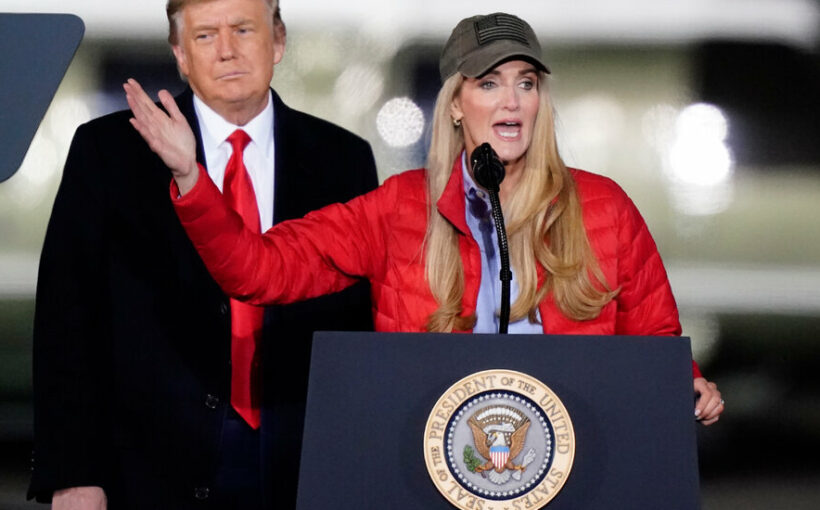Now what?
Andrew here. As companies across the U.S. condemn the attack on the Capitol and try to distance themselves from Republicans who challenged the election result, one may have a harder time than most separating itself from the controversy: Intercontinental Exchange, or ICE, the parent company of the New York Stock Exchange.
Its C.E.O. is Jeffrey Sprecher, who is married to Senator Kelly Loeffler, the Georgia Republican who lost her seat in last week’s runoff election. Ms. Loeffler ran as an unabashed supporter of President Trump, and up until the mob stormed the Capitol she planned to object to the Electoral College count. She “was one of the loudest amplifiers of falsehoods about supposed voter fraud in Georgia,” according to NPR. “Election administrators there begged for weeks for officials to stop sharing such claims, for fear of violence.”
Ms. Loeffler, who previously led investor relations for ICE, said after the Capitol attack that “the lawlessness and siege of the halls of Congress are abhorrent” and reversed her position on challenging the certification when Congress reconvened. Mr. Sprecher also condemned “the lawlessness that transpired at the Capitol” in a statement last week, and ICE told DealBook that it was pausing donations from its PAC.
Still, the roles of Ms. Loeffler and her husband, who personally gave $10.5 million to a PAC supporting his wife’s campaign and $1 million to a pro-Trump PAC last year, raise some thorny questions for the company, its board, employees, traders and the companies listed on the exchange. The company’s political entanglements are unique, but similar issues are springing up at other firms.
When Charles Schwab said yesterday that it would permanently close its corporate PAC — more on that below — it added, “We also believe it is unfair to knowingly blur the lines between the actions of a publicly held corporation and those of individuals who work or have worked for the company.” The company’s billionaire chairman, Charles R. Schwab, has personally given millions to pro-Trump and Republican groups, far more than his company’s PAC. “Every individual in our firm has a right to their own, individual political beliefs and we respect that right,” the company said in its statement.
Several companies have taken a public stand against lawmakers who challenged the election results by suspending corporate political donations, effectively saying, “We won’t do business with you anymore.” Having drawn that line in the sand with certain politicians, what about other businesses? Will the different corporate reactions to political giving after the Capitol attack affect relationships between firms? What about the personal reactions and political positions of company leaders?
So here are the questions of the day: Should this matter to companies like AT&T, Morgan Stanley and Walmart that are listed on the N.Y.S.E. and that condemned the violence at the Capitol and halted political donations? What about private companies looking for an exchange to list their shares? What do you think? Let us know at [email protected].
HERE’S WHAT’S HAPPENING
President-elect Joe Biden is set to share his stimulus proposals. The wide-ranging plan, expected to be announced this evening, will include direct payments of $2,000 for Americans; supplemental federal unemployment benefits; additional spending on vaccine distribution; and a broad infrastructure initiative. It is expected to span two bills and cost trillions of dollars.
Dollar General will pay workers to get Covid-19 vaccines. The retailer said it would give hourly workers who completed the vaccine regimen the equivalent of four hours’ pay. “We do not want our employees to have to choose between receiving a vaccine or coming to work,” the company said.
Trump’s antitrust chief is stepping down. Makan Delrahim submitted his resignation as the head of the Justice Department’s antitrust division, effective Jan. 19. DealBook obtained a copy of the letter, in which he listed the government’s antitrust investigations into Big Tech and criminal enforcement actions against no-poaching agreements among his accomplishments.
Affirm soars in its market debut. Shares in the e-commerce lender nearly doubled in their first day of trading yesterday, rising above $97 per share after being priced at $49. It’s the latest sign of exuberant investor interest in tech offerings after strong showings by Airbnb and DoorDash, with more companies on deck in the coming months.
BlackRock’s top female executive is retiring. Barbara Novick, who co-founded the investment management giant, will step down as vice chairwoman on Feb. 1. She was known as a liaison to regulators, regularly providing advice to Fed officials and others during crises, including the pandemic.
Charles Schwab scraps its PAC
Charles Schwab is shutting down its political action committee, perhaps the most significant move among companies rethinking their political giving after last week’s mob violence at the Capitol. The brokerage said it would donate its PAC’s leftover funds to Boys & Girls Clubs of America and to historically Black colleges and universities.
Capitol Riot Fallout
From Riot to Impeachment
The riot inside the U.S. Capitol on Wednesday, Jan. 6, followed a rally at which President Trump made an inflammatory speech to his supporters, questioning the results of the election. Here’s a look at what happened and the ongoing fallout:
- As this video shows, poor planning and a restive crowd encouraged by President Trump set the stage for the riot.
- A two hour period was crucial to turning the rally into the riot.
- Several Trump administration officials, including cabinet members Betsy DeVos and Elaine Chao, announced that they were stepping down as a result of the riot.
- Federal prosecutors have charged more than 70 people, including some who appeared in viral photos and videos of the riot. Officials expect to eventually charge hundreds of others.
- The House voted to impeach the president on charges of “inciting an insurrection” that led to the rampage by his supporters.
Source: Read Full Article

